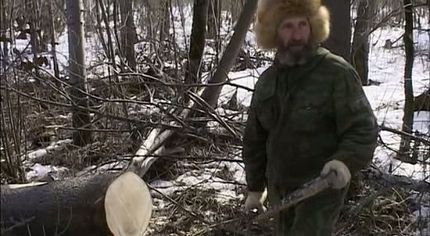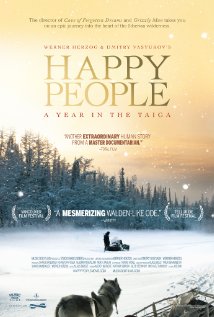Review: Herzog, Snowmobiles and Dogs Make for HAPPY PEOPLE: A YEAR IN TAIGA

But what does Werner Herzog know about happiness? If his personal joy (as concealed as it is) is measured in mileage, then he could be downright giddy. From the roughest terrain to the deadliest disasters, the serious and celebrated filmmaker has seen and conquered more in a fraction of his filmography than the average person will ever come close to experiencing. His earlier, vital films such as Aguirre: The Wrath of God and Fitzcarraldo demonstrate a determined mad precision that could only be the work of one of cinema's greatest iconoclasts. His more recent efforts continue to push boundaries both thematically (Into the Abyss), technically (Cave of Forgotten Dreams, in 3D), and geographically (Encounters at the End of the World). Although the former films cited are narrative features and the latter are documentaries, he has spent his career making both, sometimes almost interchangeably. Like the trapper's faithful dog, Herzog knows a thing or two about survival and persistence.
Once upon a time, Herzog was on the forefront of the New German Cinema - a movement that set out to hold mirror of truth up to its native land, and beyond. Whatever raw, incendiary quality his work has shed with his older age is made up for in terms of no-nonsense straight-ahead documentation, always presented with an existential flair (so often found in his trademark compellingly austere narration). Happy People: A Year in Taiga (completed in 2010 but only now seeing a wider release) is perhaps the pinnacle of his methods as of late. Co-directed with newcomer Dmitry Vasyukov (who is admittedly shortchanged here and elsewhere in terms of directorial credit, as he's an unknown the shadow of his famous partner), the film takes a show-don't-tell approach, and is all the more rewarding for it.
Although Happy People hinges on man's relationship to nature, do not mistake it for an "activism doc". To the film's credit, not once are we told of how climate change is affecting these humble peoples' way of life, or about how what they are doing or not doing effects the environment. The Taiga is a vast expanse of nature spanning the upper third of the globe and taking up much of Russia, the area covered in this yearlong film venture. To live and operate there, we're told, must require not just a certain survival instinct, but also an almost second-hand self-reliance of traditional knowledge, methods, and worldview.
The trappers spotlighted include an older man who was originally subsidized by the Soviet Union, as well as a younger relative of the great filmmaker Andrei Tarkovsky. To sit and watch and rewatch them as they meticulously apply their proven Old World ways would no doubt aid one to some degree in preparation for the End Of The World As We Know It. (Although there's no substitute for hands-on experience!) Should the apocalypse happen to occur while one is in a remote frozen wilderness, the ability to make one's own skis and canoes from felled timbers by first crafting wooden wedges with sharpened axes would certainly be useful.
But well beyond such information (be it viewed as practical or curiosity), Happy People operates on a higher plane. It presumes the notion that the easy life is not the happy life. Without veering into flakey-cakey territory in the least (that's the one place the chapped and capped grizzled men on screen couldn't handle), Herzog and Vasyukov manage to obey that old adage of show don't tell, and in so, tell of a primitive depth, intelligence and contentment so lost on so many, yet so vibrant in others. Those few, they say, are the happy ones.

Happy People: A Year in Taiga expands it's art house run in the U.S. on Friday, March 8.

Do you feel this content is inappropriate or infringes upon your rights? Click here to report it, or see our DMCA policy.






